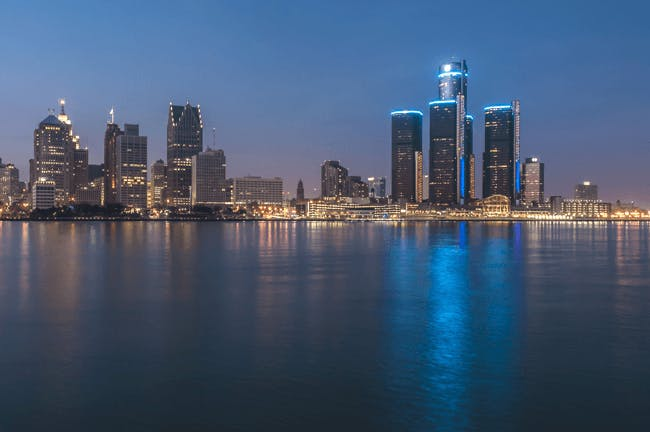
Michigan has had its share of ups and downs in the past. It’s largest city, Detroit, is one example of an American city that has seen its better days. And poor Flint just can’t stay out of the national news for its seemingly unfixable water issues. Even still, all of that negative press just can’t keep a good dog down. Not that we’re calling Michigan a dog, of course. The Great Lakes State is a fan of its white-tailed deer, has seemingly endless coastlines and just might be the beer capital of the U.S. Many of us are rooting for Michigan. This includes media site Thrillist, where Michigan landed at the top of its list for the best states to live in.
But even the most enviable states have their dark corners. For Michigan, those corners are many. Taken as a whole, Michigan is a great place to live for those who aren’t a fan of crime. Property crime in particular is well below the national average. Then along came Detroit. Whether you’re cowering in fear along 8-Mile or pleasantly enjoying a superior view of Lake Superior, home security in Michigan is still a must.
Home Security Provider Requirements for Michigan
In today’s society, being a “hipster” is all about getting onto trends before they actually become trends. This does not mean you have to be a trendsetter of sorts. You just have to have discovered some hip idea “before it was cool.” When it comes to home security provider requirements, Michigan is as hipster as it gets.
While some states, such as Kansas, have yet to discover this humble concept of home security regulation, Michigan has been regulating the industry since 1968. Michigan’s Private Security Business and Security Alarm Act covers the primary concerns for home security users. Short and sweet, this law says three specific things. First, that nobody can install alarm systems or run an alarm company in Michigan without a license. Second, that such companies cannot install devices that connect to “public service, utility, or police agency, for the purpose of delivering a recorded message,” without getting permission from the police or some official government office. And third, that person or any company that violates rules 1 or 2 (or both) are subject to at most 4 years in prison and/or a $1,000 fine.
What this means for Michigan resident is quite clear. Not just anyone can strut their stuff as a home security provider. Not if they don’t want to spend a few years in prison, that is. Michigan’s Department of Licensing Regulatory Affairs provides the requisite details for any individual, corporation, LLC and everyone in between who wants to acquire a license, start hiring, advertising and getting into the game. The licensing requirements are fairly thorough, but nothing unheard of. This thankfully includes registration of any alarm systems that are installed, employee background checks and fingerprinting, age restrictions on hiring and even minimum education requirements.
Interestingly, Michigan also requires anyone attempting to obtain a license to have experience in the field. The rules state that eligibility requires: “the security alarm system contractors’ business in another state for a period of not less than 3 years,” or that the qualifying individual “was employed in a supervisory capacity for not less than four years in a licensed security alarm agency, or was employed by a security alarm agency for not less than four years and passes a written exam on security alarm systems.” The implication here is pretty clear: no greenhorns. If anyone wants to set up shop as a home security provider in Michigan, they’ll need to have cut their teeth in the industry somewhere else first.
There are other rules that will help individuals sleep well at night. This includes the almost state-by-state standard law regarding licensure for installing electrical equipment. Many cities within Michigan have somewhat expanded versions of the state law, stacking onto the requirements. Long story short? Home security providers are forced to walk the straight and narrow in Michigan
Home Security Cameras in Michigan
Security cameras are a good way to help protect one’s castle. But in most cases, private recording is either illegal or heavily restricted, even when it comes to your own home. The purpose is because of the sometimes nefarious reasons why some people put up their security cameras.
Michigan is wholly unambiguous on this point as well. Let us direct your attention to The Michigan Penal Code, Act 328 of 1931. Before you ask: No, Michigan did not predict the invention of security cameras in 1931. The law has been amended quite a few times over the years, bringing it up to date (mostly) with our current technological times. Section 1(a) of this law contains the most relevant wording: “Except as otherwise provided in this section, a person shall not do either of the following: Install, place, or use in any private place, without the consent of the person or persons entitled to privacy in that place, any device for observing, recording, transmitting, photographing, or eavesdropping upon the sounds or events in that place.”
Note, however, that there is some leeway provided here. The law states that those individuals should be “entitled to privacy in that place”. This does not mean that hidden security cameras are outright banned in Michigan. It does mean, however, that you cannot place them in locations frequented by individuals who should expect a bit of privacy. Even if you do capture a burglar in the act, you’ll likely catch a lot of others in the act of doing things that are not illegal. Any recording of someone in a compromising position against their will is going to land you in quite a bit of trouble.
Ready to celebrate? Here’s the best part of this Michigan law: “This section does not prohibit security monitoring in a residence if conducted by or at the direction of the owner or principal occupant of that residence.” Bring out the champagne! Michigan is one of the few states that openly declares your freedom to use security cameras.
Buy a few security cameras. Put them up. Have fun. Go nuts. Just not too nuts. And make sure there are no additional rules in your city. After all, cities can add to state laws, but they cannot take away from them.
Safety During Natural Disasters
Michigan’s Natural Disaster Preparedness website lists several threats to the state’s security: disease outbreaks, earthquakes, extreme heat, floods, thunderstorms, tornadoes, wildfires and winter weather. The state’s unique location makes some of these far more likely than others. While you may be concerned that a disease-born zombie apocalypse will arise out of Ann Arbor, this is not the likely. What is likely is a severe winter storm or flooding.
The Great Lakes provide a great deal of moisture to Michigan. During the winter, they’re a ready source of moisture for strong snow storms. At other times of year, the many streams and rivers running through the state can flood due to heavy rains. Michigan residents should concern themselves with these issues, and take the correct steps to prepare for both.
Winter weather is something Michigan residents should count on experiencing every year. During winter, make sure you are well stocked with extra food, water and clothing. Winter storms can knock power out for hours, or days, depending on the severity and your location. If you have a fireplace, stock up on wood and make sure your fireplace has been cleaned. Invest in a portable generator that can help run space heaters should the power go out.
Flooding is much more difficult to predict, but no less easy to prepare for. Many items you would keep for a severe winter storm — spare food, clothing, and the like — are items you’ll want in case of a severe flood. However, if you get reports of flooding, do not drive on roads that are reported to have flooded. Even if the water on the road looks shallow, it only takes a few inches of water on the road to cause a car to lose traction and begin to float. If a flood warning is issued for your area, and you are in a flood zone, it is best to get evacuate if needed.
Michigan provides one of the best examples of a state that takes care of its own. Except for when it comes to manufacturing. And clean water. But, when it comes to home security, absolutely.

